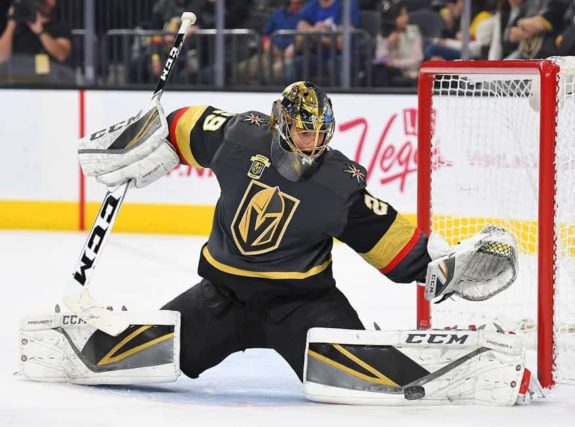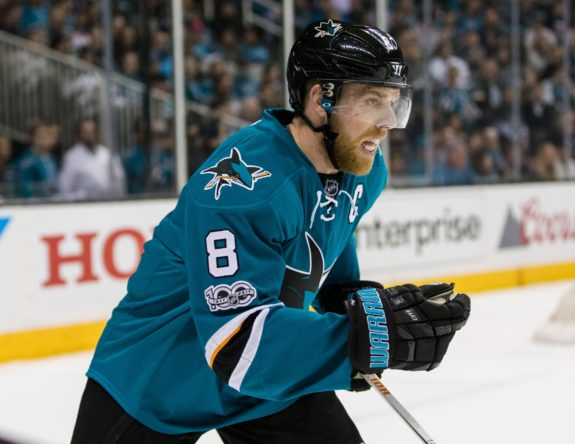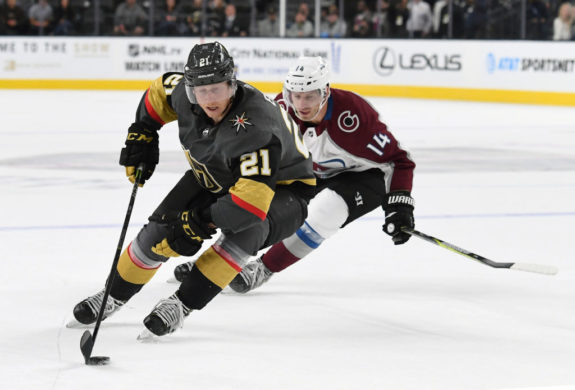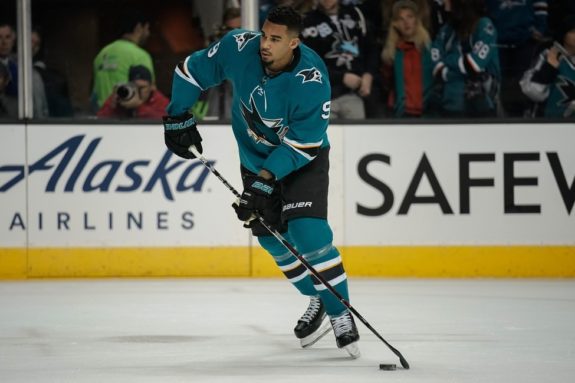The series opener between the Vegas Golden Knights and San Jose Sharks came after both teams had lengthy breaks. Both teams spent over a week between games. A break this long sometimes leads to rusty or sloppy play, especially in the early going.
Rusty and sloppy happened to the San Jose Sharks. Less than twelve minutes after the puck dropped to begin the series, the Sharks were down 4-0. Vegas was faster, but it was more than that. They were in rhythm. They knew where their teammates were. They were comfortable. The Sharks had none of this. Nor did this get better for San Jose over the course of the game, as the Golden Knights won the game 7-0.
Sharks Attempted Bounce Back
Down four goals early, the Sharks began what didn’t quite amount to a comeback, but it did amount to a semblance of a game. They were more dangerous for the balance of the opening period, but couldn’t put anything past Vegas goalie Marc-Andre Fleury. Even a 5-on-3 power play opportunity went for naught.

To start the second period, however, Vegas took control again. They dominated play and went up 5-0 following a goal by defenseman Shea Theodore less than four minutes into the period.
The fifth Vegas goal marked the end of the night for Sharks goalie Martin Jones, who allowed only four goals in the entire series against the Anaheim Ducks. Some won’t blame Jones for the five goals, and to be sure, Vegas made life difficult for him. But assuming some of this is rust, 24 minutes of action might not have been enough to get rid of it. Backup net minder Aaron Dell, for what it’s worth, made his playoff debut and was solid, stopping 19 of 21 shots. Both goals Dell allowed came on Vegas power plays.
Sharks Lose Poise, Vegas Gets It
The rest of the game didn’t help the Sharks answer any questions, at least not in a good way. The team continued to struggle, unable to get the puck past Fleury. Frustrations boiled over in period three. During play, Joe Pavelski decided to start whacking Vegas defenseman Nate Schmidt during play behind the Vegas net. The official eventually raised his hand after a slash and play stopped. Evander Kane waded into the scene and crosschecked Pierre-Edouard Bellemare in the shoulder. And for good measure, he then crosschecked Bellemare in the face. Pavelski went to the box for two minutes; Kane got a five minute major and was tossed from the game. Both Sharks players deserved their fate in the game (though I’d say Kane’s subsequent one-game suspension seems overkill when compared to prior rulings).

In the opening series, the Sharks maintained their poise and watched Anaheim self-destruct. Against Vegas, the Sharks self-destructed. Sure the game was out of reach – and made even more so as Vegas added a pair of power play scores – but the Sharks had things they needed to accomplish in the final period and this didn’t help.
I’ll cite an example of how San Jose wasn’t sufficiently focused. When the Sharks had a 5-on-3 power play against the Ducks, they had two players go below the goal line almost immediately; they scored just ten seconds into that 5-on-3 advantage. Against Vegas with 40 seconds of 5-on-3 time, no one took the puck below the goal line. What worked perfectly against Anaheim, wasn’t even attempted against Vegas.
Focus was something Vegas accomplished and they maintained it all game long. By playing a strong 60-minute game, they gave the Sharks more reason to doubt themselves. Even with the big lead, Vegas outshot the Sharks in both the second and third periods.
Overcoming Blowouts
Last season, the Sharks whipped Edmonton 7-0 in Game 4 of their series, but then lost the next two games and with it, the series. Blowout playoff games can happen without defining the series. Indeed, the Sharks 8-1 win over Anaheim in Game 3 of the opening round was followed up with an evenly played nail-biter the next game.
Giving up nine power plays (including one major) probably best describes the Sharks lack of discipline. In the season’s first 86 games, the most power play chances San Jose allowed was six. To be fair, Vegas might have shown a little rust on this front, too. They took five penalties themselves.

Vegas thrived on quick-strike scores. After the opening score, where Cody Eakin deflected a Brayden McNabb shot past Jones (with Paul Martin trying to defend two players at the front of the net), the rest of the Vegas scores were either quick-strike scores or came on power play. Interestingly, the Sharks bottom six forwards were not on the ice for any of the Golden Knights even strength scores.
Vegas and Pittsburgh
When I look at Vegas, their playing style reminds me of the Pittsburgh Penguins team San Jose had great trouble with in their Stanley Cup Final series in 2016. Like the Pens, Vegas uses a fast, disruptive defensive style to smother their opponents offensive structure. Like the Pens, Vegas creates turnovers which lead to quick-strike scoring opportunities. These teams make it difficult for opponents to make the right decision with the puck when trying to clear it or get cleanly through the neutral zone. Often times, Vegas forced mistakes by giving the Sharks so little time they were unable to properly read what was happening on the ice. Which is the same thing Pittsburgh did to the 2015-2016 version of the Sharks.
Some will cite the speed Vegas uses as a key factor, and they’ll be right. But it’s only half the point. It is their relentless style of play which creates major opportunities out of mundane moments or minor errors. Which is also the Penguins style.
While not a lot worked in the series against the Pens, one thing which did was having the Sharks bigger, stronger players take the puck down low and bull their way to the net. Tomas Hertl and Brent Burns were both effective this way. Burns and Hertl are still capable of doing this, newcomers Kane and Timo Meier are also capable. Powering to the net and working behind the net are among the Sharks best counter measures.
Sharks Questions
A whole lot of questions await San Jose.
Can the Sharks adjust to the style of game Vegas plays? Can the Sharks compete with Vegas’ speed? Can they stop the quick-strike scores? Can Martin Jones get back into his groove? Can San Jose find their poise? Can they stop making the turnovers which Vegas is so good at capitalizing on? Can they regain their defensive discipline? Can they keep themselves out of the penalty box? Can they solve Marc-Andre Fleury? Will the Sharks make lineup changes beyond addressing the Kane suspension? Can the Sharks use their power forwards (and Burns) to create opportunities?

These answers need to wait for Saturday evening, when Game 2 is played. As for lineup changes, players like Paul Martin, Kevin Labanc and Melker Karlsson (who took a hit to the head in the third period and missed the rest of the game) are the most likely candidates to get replaced.
A whole series of challenges the Sharks didn’t face in the first round, they face now. Playoff success usually requires overcoming adversity. For the Sharks, adversity is here. The biggest question the Sharks face is simply this: can they overcome adversity?